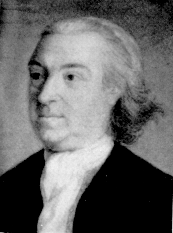<Back to Index>
- Economist James Denham Steuart, 1712
- Painter Jan Altink, 1885
- Marshal of France Charles Pierre Francois Augereau, 1st Duc de Castiglione, 1757
PAGE SPONSOR

Sir James Denham-Steuart, 7th Baronet (21 October 1712 – 26 November 1780) was a British economist.
He was the only son of Sir James Steuart, Solicitor General for Scotland under Queen Anne and George I, and was born in Edinburgh. After graduating from the University of Edinburgh he was admitted to the Scottish bar at the age of twenty-four.
He then spent some years on the Continent, and while in Rome entered into relations with the Young Pretender, Charles Edward Stuart. He was in Edinburgh in 1745, and so compromised himself that, after the battle of Culloden,
he found it necessary to return to the Continent, where he remained
until 1763. It was not until 1771 that he was fully pardoned for any
complicity he may have had in the rebellion. He died at his family seat, Coltness, in Lanarkshire. In 1767 he published Inquiry into the Principles of Political Economy. It was the most complete and systematic survey of the science from the point of view of moderate mercantilism which
had appeared in England and indeed the first fully fledged economics
treatise to appear anywhere. Also the German philosopher Hegel recognized that book and wrote a comment about it in the year 1799. Although often regarded as part of the Scottish Enlightenment which produced David Hume and Adam Smith,
Steuart's economics hark back to the earlier Mercantilist era. More
accurately, while on the Continent, Steuart had imbibed the
sophisticated Enlightenment Mercantilism that was in the air -- particularly, German Neo-Cameralism --
which combined a legal - statist approach with a "natural" approach to
economics. Although a promoter of old fashioned export subsidies and
import tariffs, Steuart added several elements that tied this in with a
more general theory of economic development. Unlike the old
Mercantilists, he recognized Richard Cantillon's "population - subsistence" dynamics. He also introduced the concept of diminishing returns to land. Steuart juggled two interesting theories of price -- a long - run labor theory of value and
a short - run "demand - and - supply" theory. Indeed, Steuart was among the
first to introduce the term "equilibrium". Thus, Steuart was an
important forerunner of both the Classical and Neoclassical schools in many respects. Steuart also provided one of the more able statements of the real bills doctrine of money. Although the work appears to have been well received its impact was overshadowed by Smith's Wealth of Nations that was published only nine years later. It is interesting to note that Adam Smith never
quotes or mentions Steuart's book, although he was acquainted with him.
It has been argued that Smith avoided Steuart arguments because they
would have undermined his Utopia. Moreover, the attacks on Mercantilism in
the Wealth of Nations appear to have been mainly directed against
Steuart. As Smith appears to have thought that Steuart's conversation
was better than his book, he probably wished to keep clear of
controversy with him. Steuart's book was received much more favourably a century later by the members of the Historical school of economics.